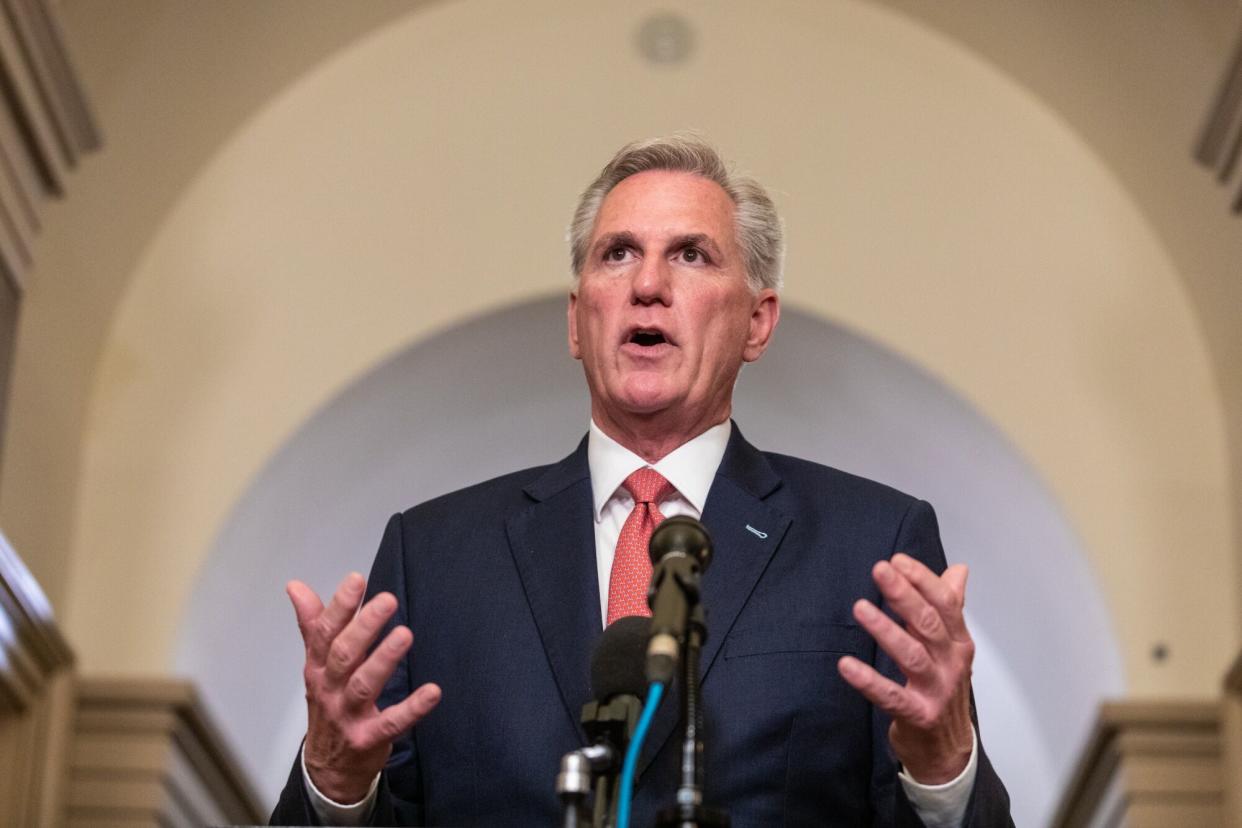Debt-Limit Talks Resume After Optimism Curbed by GOP Walk-Out

- Oops!Something went wrong.Please try again later.
(Bloomberg) -- White House and Republican negotiators met Friday night to resume talks to avert a catastrophic US default and conversations are expected to continue through the weekend.
The 90-minute meeting in the Capitol came after a Republican walk-out punctured optimism that a debt-limit deal was near and drove down stocks. A person familiar with the talks said the negotiators plan to meet again Saturday.
Neither negotiating team commented on progress as they left the meeting. Republican Representative Patrick McHenry, a key ally of Speaker Kevin McCarthy, asked if he was confident the two sides would reach a deal in time to prevent a default, responded, “No.”
Another Republican in the meeting, Representative Garret Graves of Louisiana, said it was not a negotiation.
“This was a candid discussion about realistic numbers, a realistic path forward, and something that truly changes the trajectory of this country’s spending and debt,” Graves said.
McCarthy announced the restart of discussions following a pause of several hours. White House negotiators hand-picked by President Joe Biden returned to the Capitol shortly afterward for the evening session.
“We took a pause because of the frustration that this White House will not acknowledge that they’re spending too much,” McCarthy said in an interview with Fox Business.
Shalanda Young, director of the White House Office of Management and Budget, and Steve Ricchetti, a senior Biden adviser, arrived back at the Capitol minutes after McCarthy spoke. They didn’t comment as they entered a negotiating room where Republican Representatives Patrick McHenry, Garret Graves and McCarthy Chief of Staff Dan Meyer awaited, and the door slammed shut.
White House Press Secretary Karine Jean-Pierre, briefing reporters in Hiroshima, Japan, where Biden is attending the Group of Seven summit, said “There continues to be real differences between the parties on these issues.” She did not elaborate on the differences.
She added that the president remained “confident that there’s a path forward” and received updates on the talks. “The president is all over this,” Jean-Pierre said.
The swift resumption of talks on Friday highlighted the whipsaw battle between Republicans and the White House over spending cuts, which GOP lawmakers demand as the price for raising the federal borrowing limit.
Just a day ago, McCarthy said that he expected a deal as soon as this weekend and began laying the groundwork for votes in the House next week. But then GOP negotiators walked out of talks with White House officials.
McCarthy said an increase in spending sought by the White House is “not going to happen” and said it’s been frustrating the White House continues to push for more spending in the talks.
While walking to the ornate meeting room where the talks Friday night were being held, McHenry declined to, in his word, “characterize” the issue or issues that had caused the temporary halt.
Breakdowns aren’t unusual in high-stakes Washington negotiations, especially as deadlines near and hard choices come into sharper focus. Both Biden and McCarthy confront frenetic campaigns by more ideological members of their parties alarmed that their priorities will be sacrificed to reach a compromise.
Tobin Marcus at Evercore ISI wrote to clients on Thursday saying, “We caution investors not to overestimate how quick or smooth the path to the finish line will be.”
McCarthy’s uncharacteristically upbeat comments Thursday on the prospects for an agreement on the US borrowing limit sent stocks upward, with the S&P 500 hitting a nine-month high, closing just shy of 4,200. Treasury Secretary Janet Yellen has signaled a default could become a risk as soon as June 1.
But news of the breakdown on Friday triggered a slump in stocks, with the S&P 500 at one point losing almost 0.8% from its high of Friday’s session, though the decline moderated later. The index closed down 0.1%. Yields on US Treasury bills that mature in early June resumed climbing Friday, showcasing concerns about potential payment-default risks.
There was not a dramatic flare-up in the room before the Republicans stormed out Friday morning, according to one person familiar with the negotiations. Another person familiar with the talks said it wasn’t a specific issue but ranged broadly across GOP budget-cutting demands.
White House aides told Republicans that just as there were proposals that the House speaker had explained would prompt too many members of his party to defect – like raising additional revenues through closing tax loopholes – there were policies the GOP side was pursuing that would lead to mass Democratic defections.
Minutes after the Republican negotiators walked out of the talks, former President Donald Trump posted a social media statement saying GOP lawmakers shouldn’t make a deal unless they get “everything they want” and added “including the ‘kitchen sink.’”
The conservative House Freedom Caucus on Thursday called for an end to bipartisan debt-limit talks, insisting instead that the Senate vote on the House Republican bill passed in April with sharp spending cuts across the board. Progressive Democrats mounted a fervent campaign opposing potential concessions to Republicans, including expanded work requirements to be applied to food stamps, welfare and Medicaid.
Sixty-six progressive House Democrats on Friday urged Biden in a letter not to compromise with Republicans on expanded work requirements or cuts to safety-net and climate spending and instead invoke an untested interpretation of the Constitution’s 14th Amendment to override the debt limit.
--With assistance from Jarrell Dillard, Jordan Fabian, Jenny Leonard and Christopher Anstey.
(Updates with White House reaction, starting in ninth paragraph.)
More stories like this are available on bloomberg.com
©2023 Bloomberg L.P.


